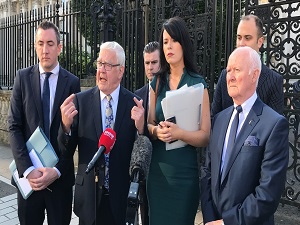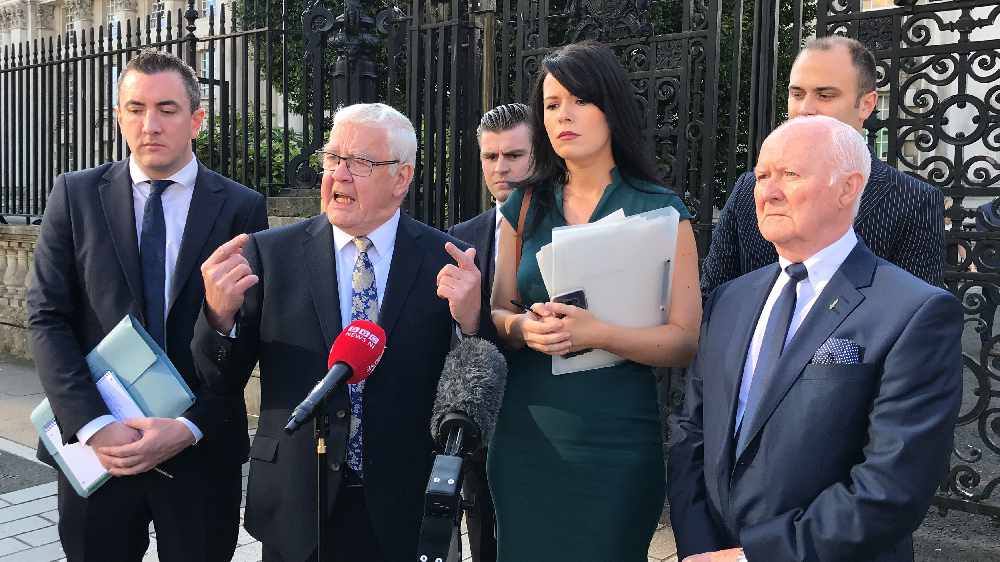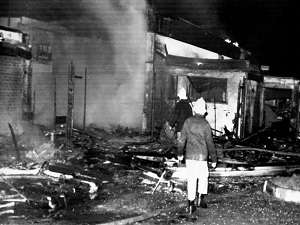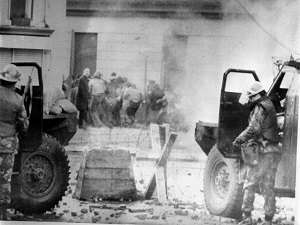
By Rebecca Black
The Court of Appeal is set to hear a PSNI bid to take a challenge against three recent rulings on legacy cases to the Supreme Court.
One of the cases set to be mentioned on Thursday concerns a group of former internees known as the Hooded Men who earlier this year won the latest stage of a legal battle to force an investigation into alleged torture by the security forces in 1971.
The Court of Appeal in Belfast in September dismissed an appeal by police against a ruling that detectives should revisit a decision to end their inquiry.
The second case expected to be mentioned is a ruling made in July that the families of the victims of the Glenanne Gang had a legitimate expectation an independent investigation would take place.
The third concerns a ruling in April that the PSNI Chief Constable had not shown that a legacy unit within his force had the practical independence for a new probe into the suspected military killing of Jean Smyth in west Belfast 47 years ago.
The PSNI is seeking to appeal against the rulings to the Supreme Court.
Ahead of Thursday's hearing, Francis McGuigan, one of the so-called Hooded Men, said he remains "determined to secure justice".
"The Court of Appeal and before that the High Court were right when they said there should be an investigation to identify and hold to account those ministers, MoD and RUC officers who were responsible for authorising and carrying out torture on us," he said.
"Nearly five decades on I remain determined to secure justice."

Some of the 'Hooded men' with legal teams and Amnesty International's Grainne Teggart after a previous court ruling.
Grainne Teggart, Amnesty International's Northern Ireland campaign manager, added: "We will continue to support their right to an independent, human rights-compliant investigation.
"This latest appeal by the PSNI will only serve to further delay those responsible facing the full rigour of the law."
Responding in a statement, the PSNI's Assistant Chief Constable George Clarke said that the judgment as it stands "may have significant implications for present day policing".
"We have carefully considered the judgment in the McKenna/McGuigan case and we will comply fully with the order of the court," he said.
"We are actively seeking to put in place an independent review into these matters and we hope this will be of some comfort to those who have been affected by this case.
"Having studied the judgment and sought legal advice, it is clear that the judgment as it currently stands may have significant implications for present day policing.
"As a consequence, we have come to a decision that we must appeal elements of the judgment relating to practical independence and legitimate expectation.
"This appeal is not about the past but about the future of operationally independent and accountable policing.
"It is important to note that lodging this appeal will not affect the steps PSNI is progressing to put in place an independent review."
Mr Clarke added: "The right place for any legacy investigation is with a Historical Investigations Unit as outlined in the Stormont House Agreement. PSNI have given their full support to the Stormont House Agreement; but making progress on this important issue sits in the political space."


 Police launch murder probe following ‘brutal and senseless’ death of woman
Police launch murder probe following ‘brutal and senseless’ death of woman
 More than 5,000 NI children set to spend Christmas in temporary accommodation
More than 5,000 NI children set to spend Christmas in temporary accommodation
 No evidence of police collusion in 1978 La Mon bombing
No evidence of police collusion in 1978 La Mon bombing
 Sex offender who targeted girls online across the UK jailed for 27 years
Sex offender who targeted girls online across the UK jailed for 27 years
 Pre-trial rulings due in Bloody Sunday prosecution of Soldier F
Pre-trial rulings due in Bloody Sunday prosecution of Soldier F